Education
Norcross High Mock Trial Team Prepares Students for Future Careers
Published
1 year agoon
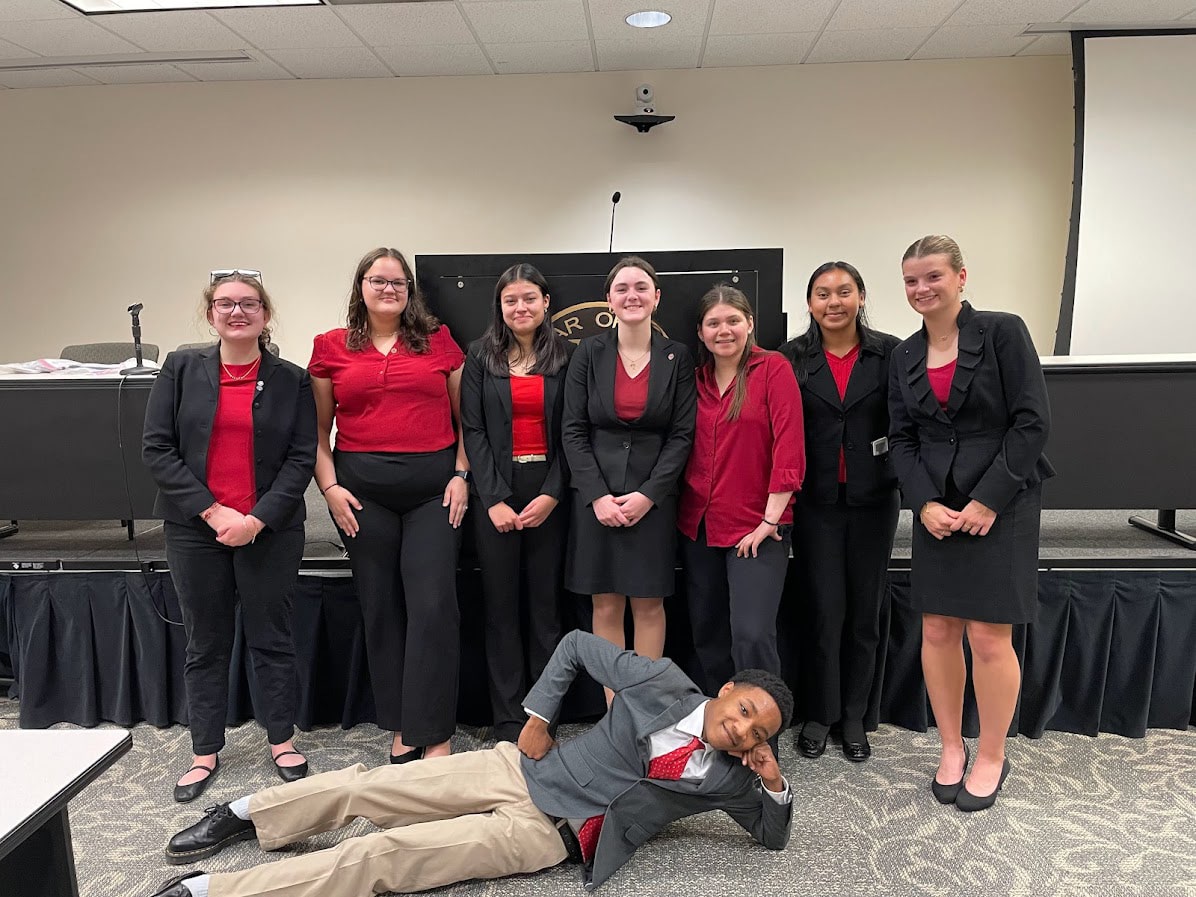
Team sports often get all the glory for building character and life skills in young people, but despite popular belief, mock trials aren’t just for students who want to be lawyers.
“It’s the sport for the intellectuals that want to exercise their minds,” said Matt McGahren, head attorney coach of the Norcross High School Mock Trial team.
“I think what it does for these high school students is that it gives them not just speaking skills and logical reasoning skills but also a lot of self-confidence and self-esteem. It shows them the value of hard work. They exercise not just their mind but their creativity,” he explained.
Students thrive in mock trial
Along with attorney coach Skip Hudgins and teacher coach Harold Wright, youngsters are guided through mock cases to give them an authentic look into the legal system.
Those who play witnesses learn to be actors in a way. Regardless of the profession the students will pursue, the most valuable lesson is the art of persuasion.
“The advantages they have interviewing with employers later in life and interacting in the work environment, I just think it’s a phenomenal opportunity, and I think we want more people to know about it,” said McGahren.
The coaching has paid off. Norcross High School has gone to the state finals five years in a row.
“I think [students] can come in with a variety of different strengths, and then we just build the parts that aren’t there, as well as the motivation and the desire to do it,” said McGahren. “I come from a background of being too scared in high school to even get up and speak, and I wish I had pushed myself to overcome those fears. So, I think willingness is the best skill they need to have.”
Wright, a social science teacher at Norcross High School, agreed.
“Mock trial entails learning some researching because too often, especially now, they talk about false narratives and fake news and stuff like that where people just take information, pull it out of the sky, and act like it’s true,” he said.
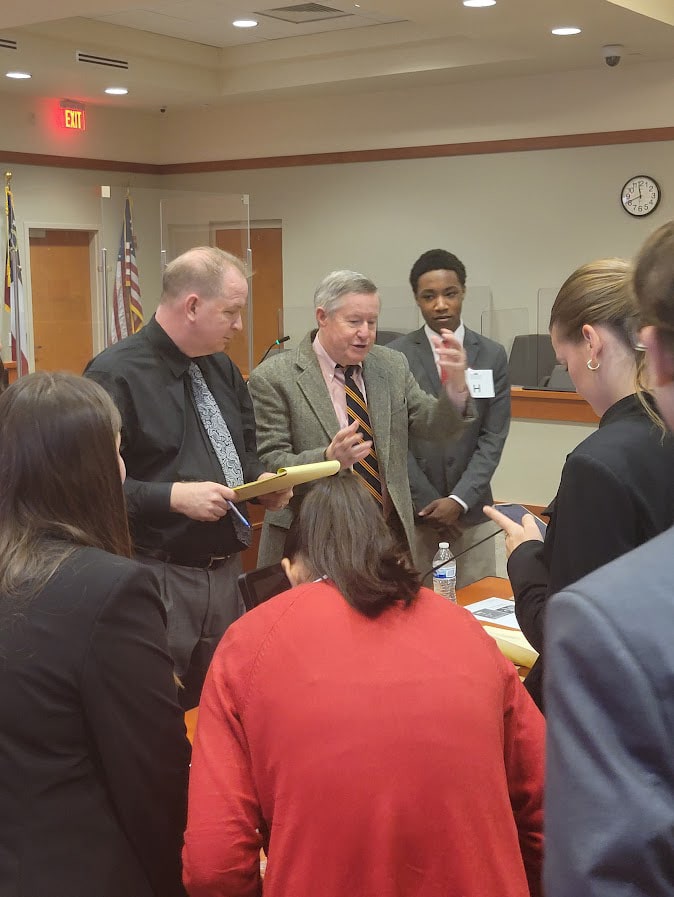
The Georgia Mock Trial Competition
The competition is designed to increase students’ understanding of and appreciation for the law, court procedures and the legal system, according to sponsor State Bar of Georgia.
“They get a problem from the state and don’t really research the law, but they learn the rules of evidence,” said McGahren.
Preparing for the competition creates a family atmosphere because alums help the students, and it’s like a fraternal society.
The state bar’s mock trial committee prepares a problem for high school mock trials that contains a fact pattern and witness statements. It has legal authorities like case law for the competitors to refer to, and a narrative goes along with it.
Basic guidelines
“It will either be a civil case or a criminal case. And this year’s case was a criminal case. So the challenge was to figure out what’s going on in the problem, figure out who the characters are, and find out what the legal questions are,” said Wright. “The team has to represent both sides of the case, the prosecution, and the defense, and they develop a theory of what they think happened from their perspective.”
The teams work on developing the characters, starting with witness statements.
“We have not only great student attorneys, but we also have great witnesses,” said Wright. “We have a few months from October to January to prepare the case. We do scrimmages against other schools. Then there are three rounds of competition.”
He explained that there’s a regional competition, a district-level competition, and a state competition.
“Our team will be assigned either prosecution or defense for each round,” said Wright. “It’s like an unscripted simulation. They play the case out in court, and we often have actual judges for the rounds and attorneys who act as evaluators. They’re the jury.”
The students are rated on how well they do for their part and are also given a lot of constructive feedback. Sometimes, the cases are loosely based on actual problems or legal issues.
“There was one several years ago that was about the Castle Doctrine – the stand-your-ground laws,” said Wright. “But it’s not a specific case, but sometimes it’s maybe a legal concept that the kids might have heard about.”
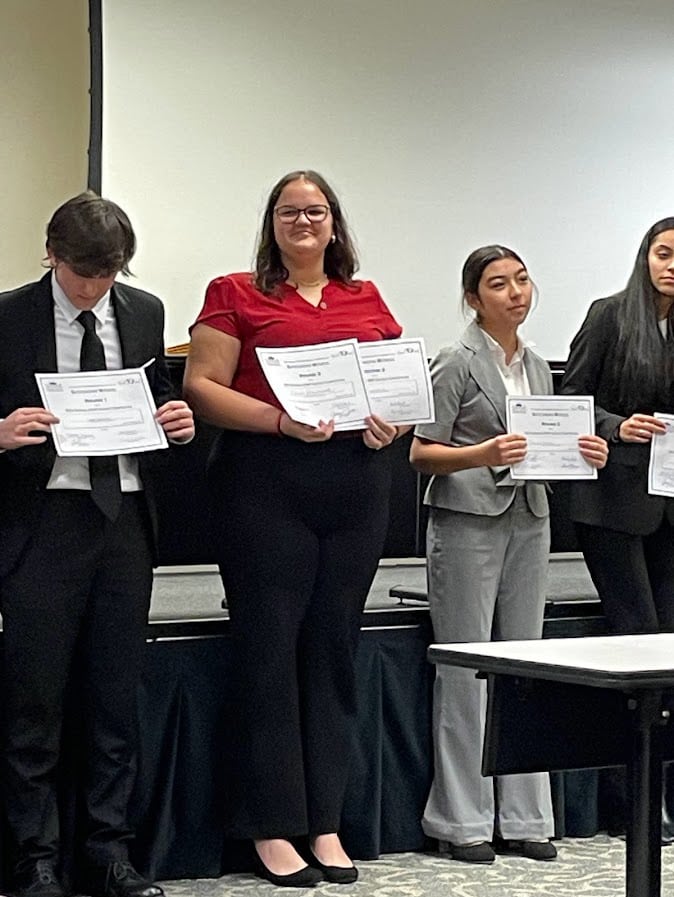
Faux court, real results
Recent grad Elena Domenech has been in mock trial for three years and recommends it.
“I wholeheartedly believe it was the best decision that I ever made. I met some of my best friends, and I learned how to be confident in myself,” she said. “I wrote my college essays about mock trial and what it meant to me, and it has been an experience of joy, growth and positivity.”
She added that making it to the state semi-finals this year was an amazing feeling, especially considering how worried the team was coming into the competition.
“It all just goes to show how much hard work is worth. I am excited to try out for Georgia Tech’s mock trial team and am even more excited to take what I have learned with such an incredible team with me throughout the rest of my life,” she said.
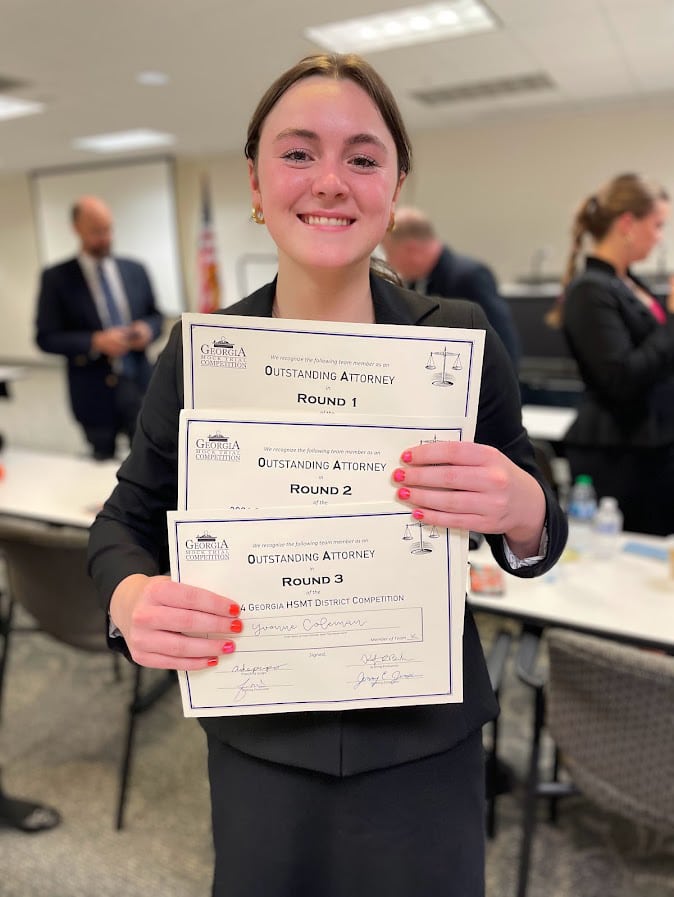
Rising senior Yvonne Coleman has also been in mock trial for three years and had similar feelings.
“It is by far my favorite and most beneficial extracurricular I participate in,” she said. “This year, Norcross’ Mock Trial team qualified for the state semi-finals, winning every Outstanding Witness and Attorney Award at State Competition. I am beyond proud of my team’s success!”
She added that mock trial has improved her writing and speaking skills. It has also given her the confidence that one day she might argue a case before the U.S. Supreme Court or even become a Supreme Court Justice herself.
Related
Arlinda Smith Broady is part of the Boomerang Generation of Blacks that moved back to the South after their ancestors moved North. With approximately three decades of journalism experience (she doesn't look it), she's worked in tiny, minority-based newsrooms to major metropolitans. At every endeavor she brings professionalism, passion, pluck, and the desire to spread the news to the people.

Education
Celebration and Community: ICAGeorgia Wraps Up School Year with Two Festive Events
Published
1 week agoon
May 22, 2025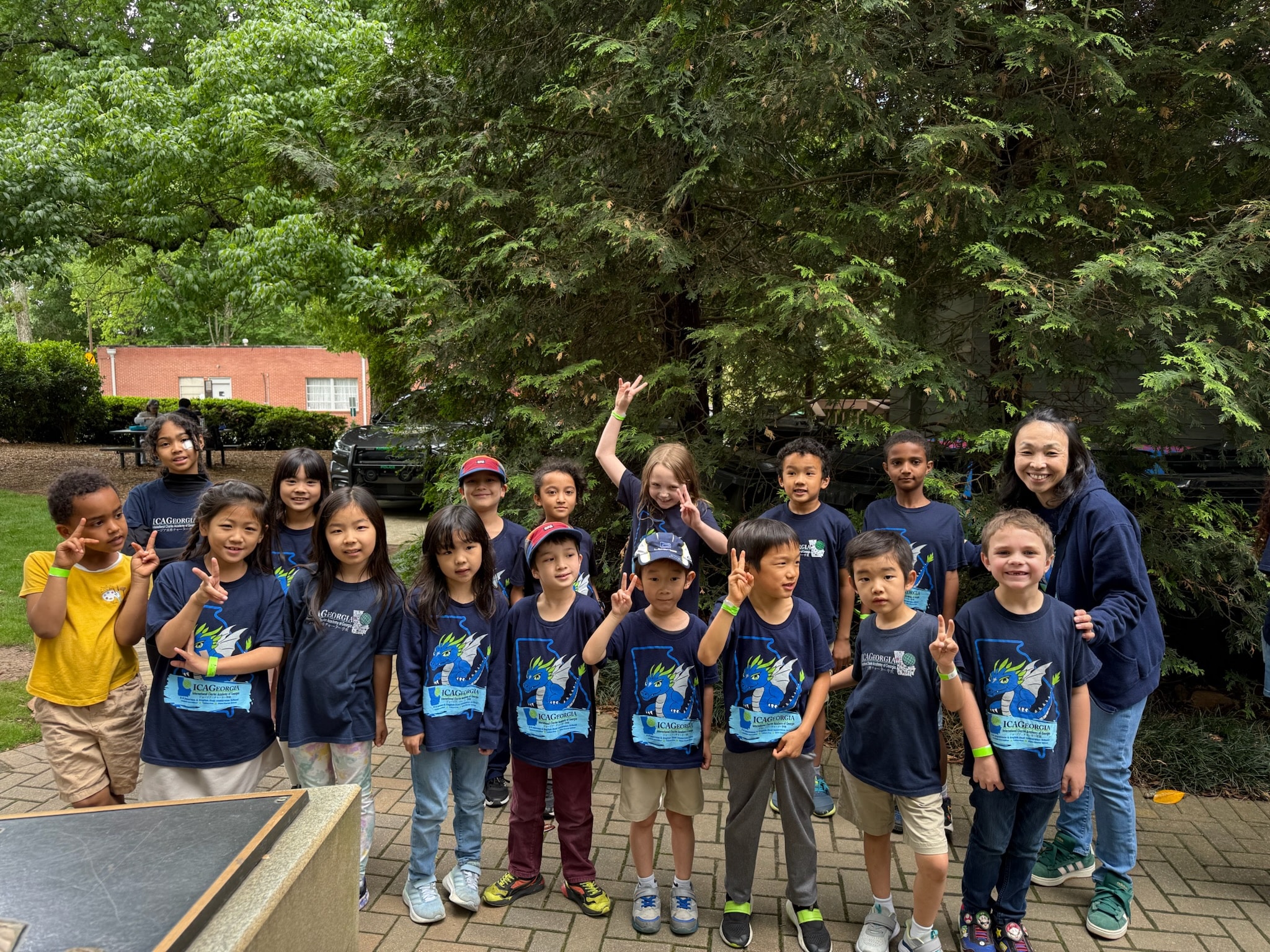
The International Charter Academy of Georgia (ICAGeorgia) recently hosted its third annual Dining with the Scholars event on April 18 — an evening filled with celebration, culture and community spirit.
Held at Canton House in Duluth, the event welcomed over 200 attendees, including students, parents, teachers, board members, local sponsors and special guest, the Consul General of Japan.
Fundraising and performances
The purpose of the event was twofold: to raise funds in support of academic programs for the school and, most importantly, to honor and showcase the outstanding talents and achievements of ICAGeorgia students.
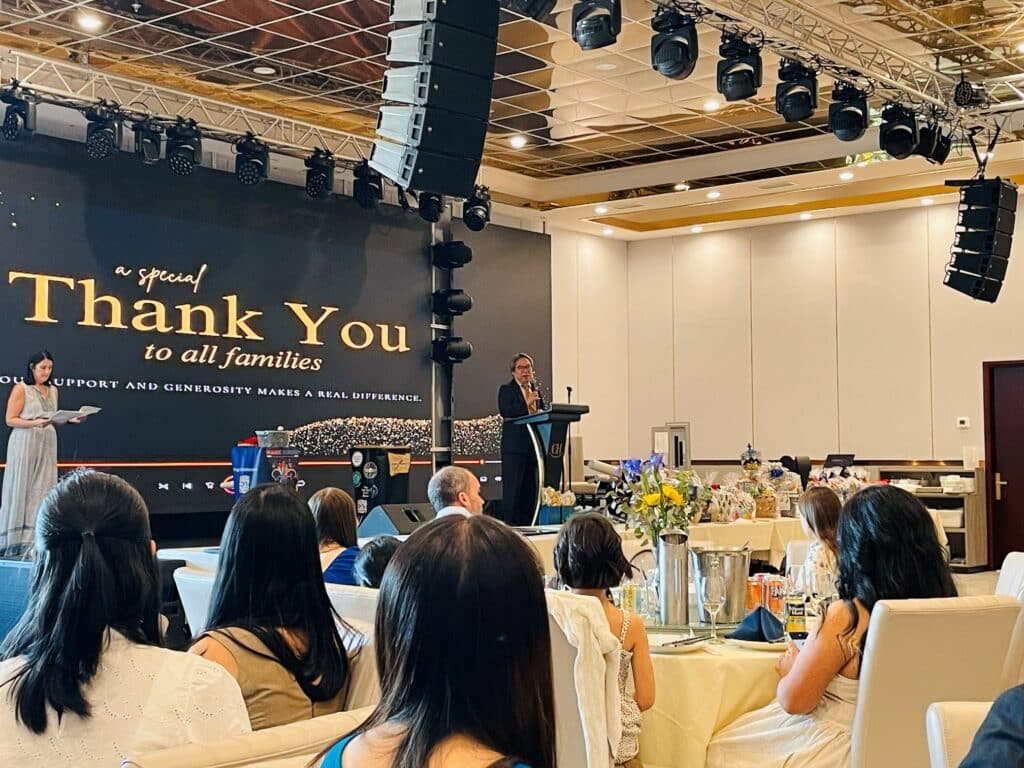
Throughout the evening, guests enjoyed a silent auction, dinner and dessert, as well as a vibrant lineup of student performances, a magic show and live music — creating a truly festive and memorable atmosphere.
“We extend our heartfelt thanks to the many local companies and organizations whose generous sponsorship made this event possible,” said Felecia Tucker-Jones, principal of ICAGeorgia. “[The] support helps us continue to grow and enhance our academic offerings.”
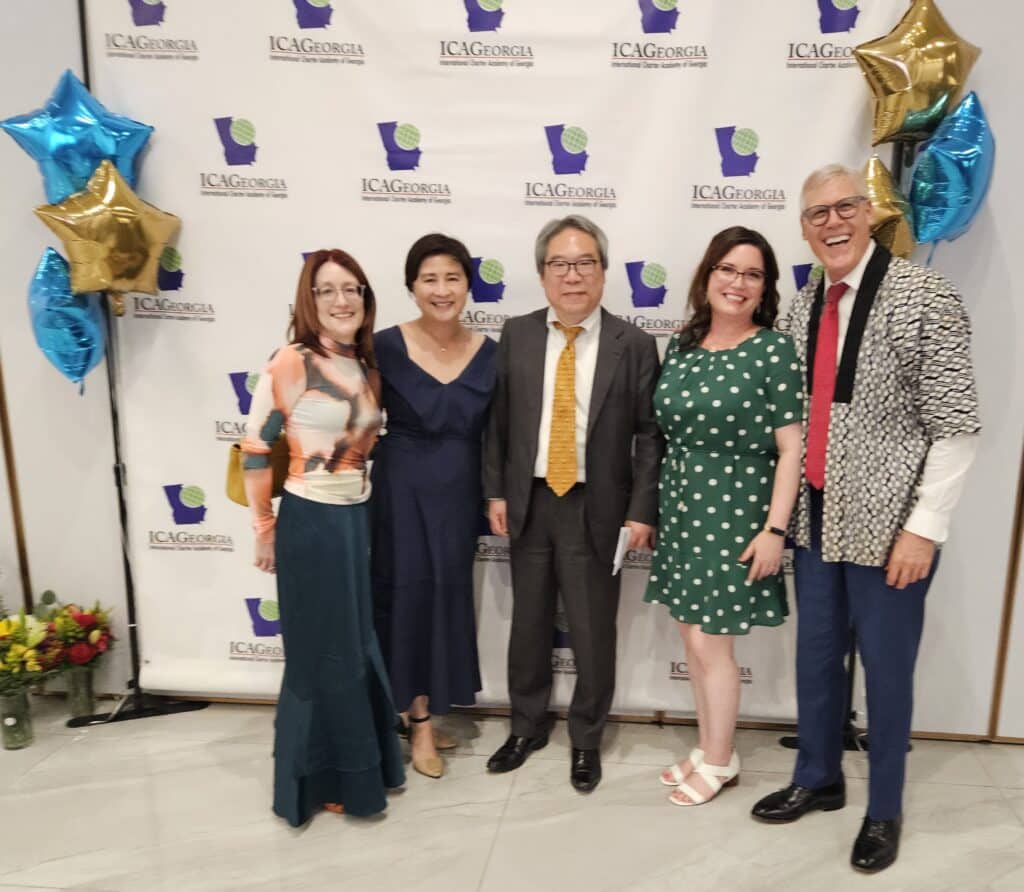
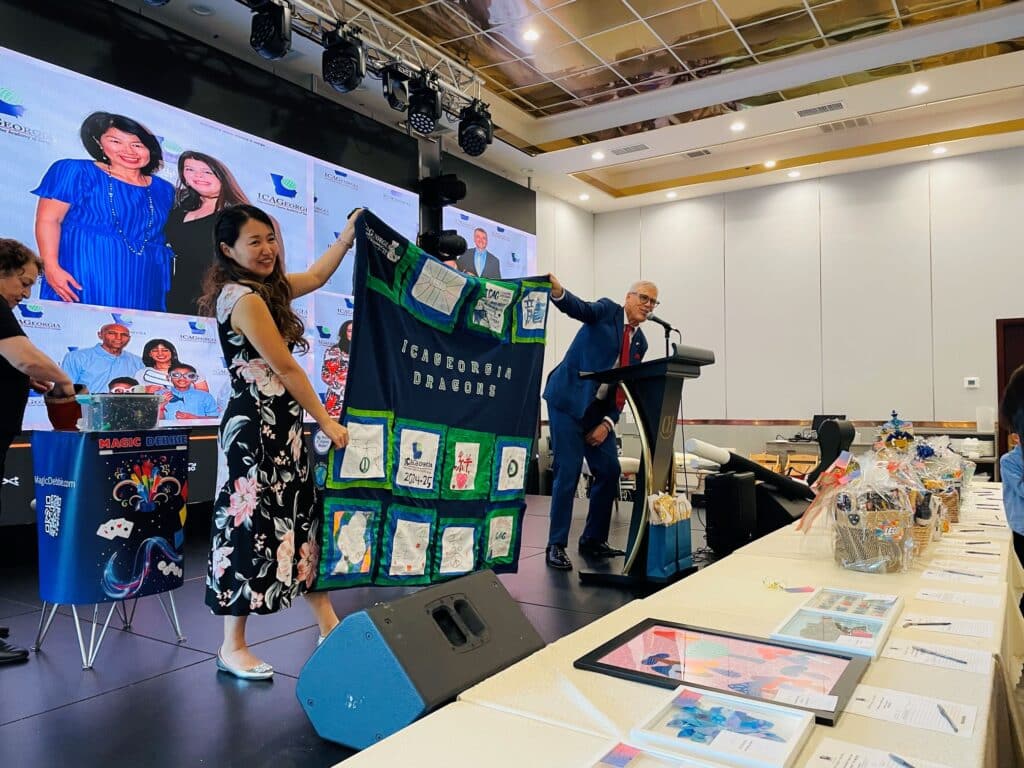
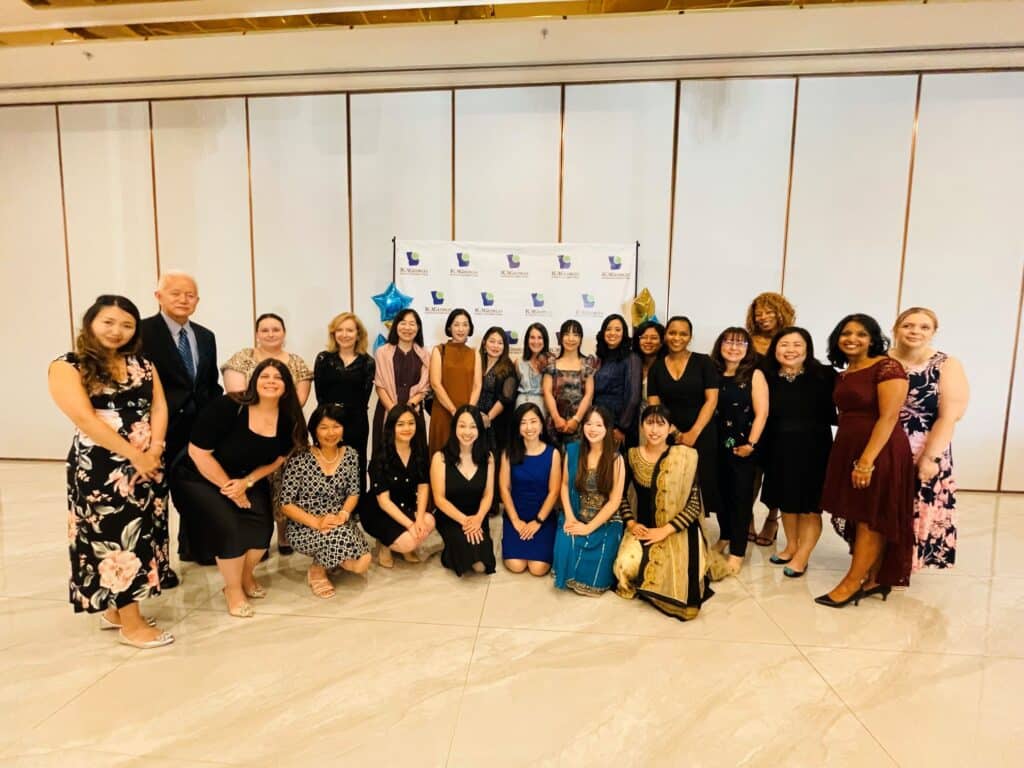
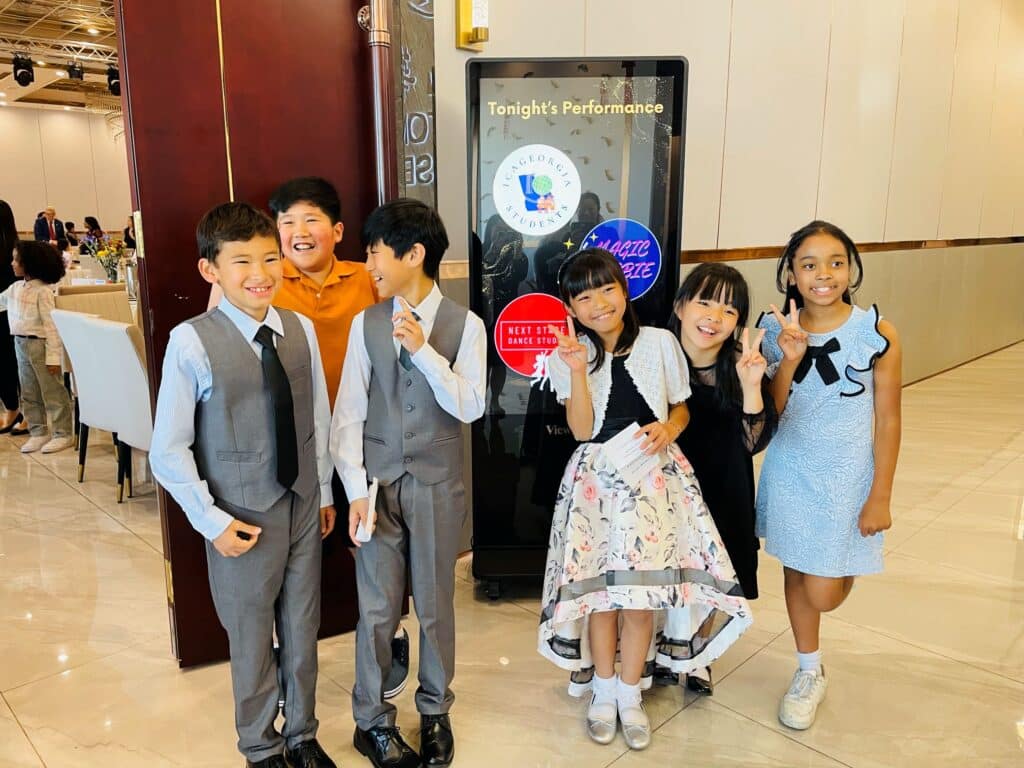
By all accounts, it was a night to remember — and a wonderful reminder of the strong, supportive community that surrounds the school.
Children’s Day Festival
On May 4, students, families and community members gathered at Thrasher Park in Norcross for a vibrant celebration of Children’s Day, a beloved Japanese holiday that honors children’s happiness, growth and well-being.
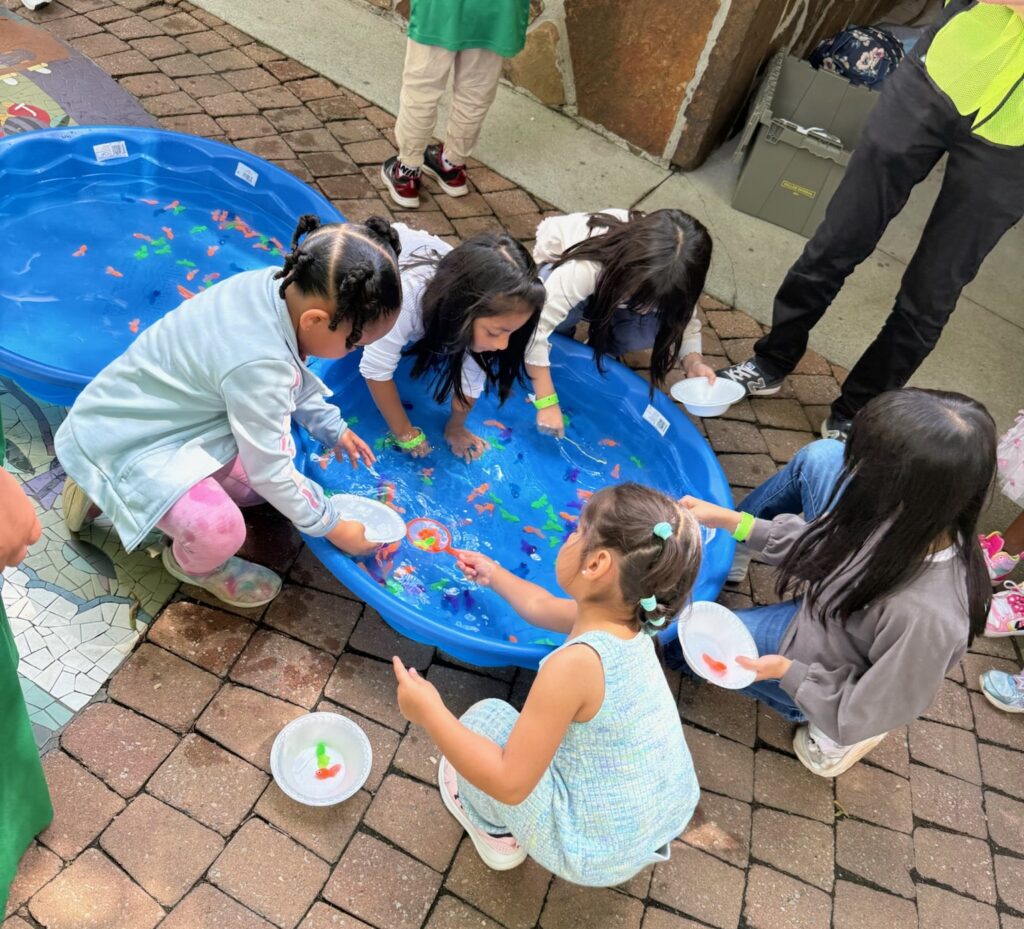
The Japan’s Children’s Day Festival 2025 brought together over 1,000 attendees for a full day of music, crafts, food and cultural experiences.
Visitors of all ages enjoyed traditional Japanese activities such as origami, kingyo sukui (goldfish scooping) and kimono try-ons, while kids played in bounce houses, participated in golf and soccer games and listened to story time in the park.
The festival’s stage was alive with performances from school choirs, dance studios and even a thrilling showcase of breakdancing and karate. Local vendors offered delicious international food — from pizza, tacos and paella to boba and shaved ice — while guests explored artisan booths and even online shopping options.
Culture and community
This festival was a beautiful reflection of cultural pride and community spirit and partnerships, with ICAGeorgia, local small businesses and generous sponsors bringing the vision to life.
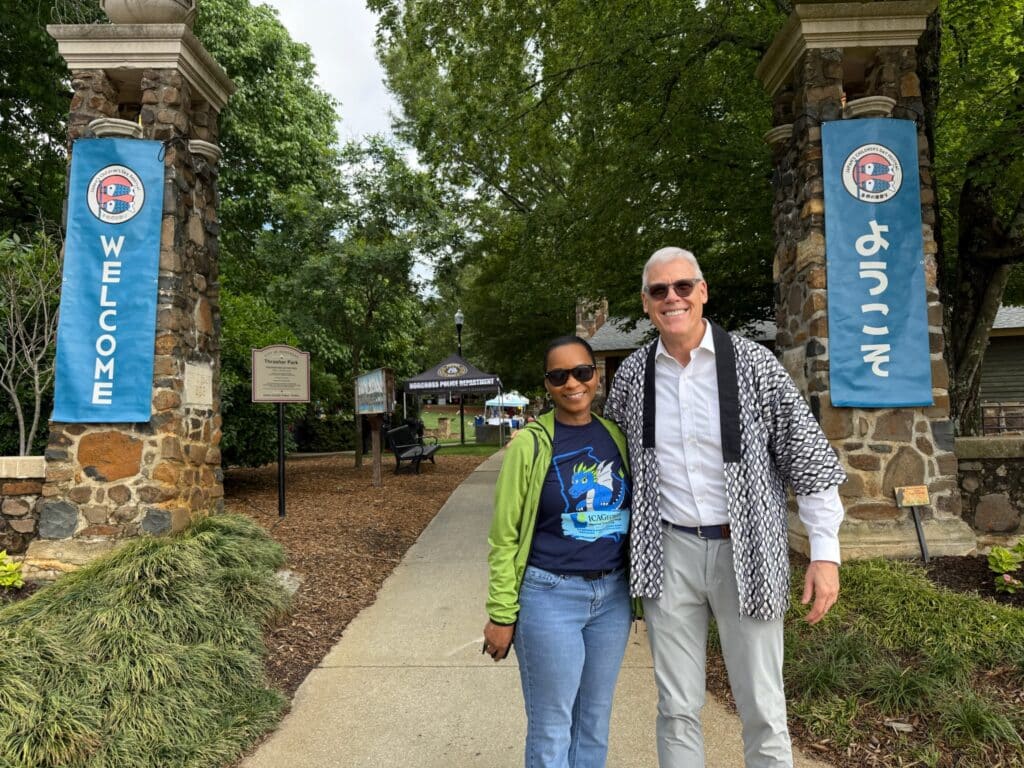
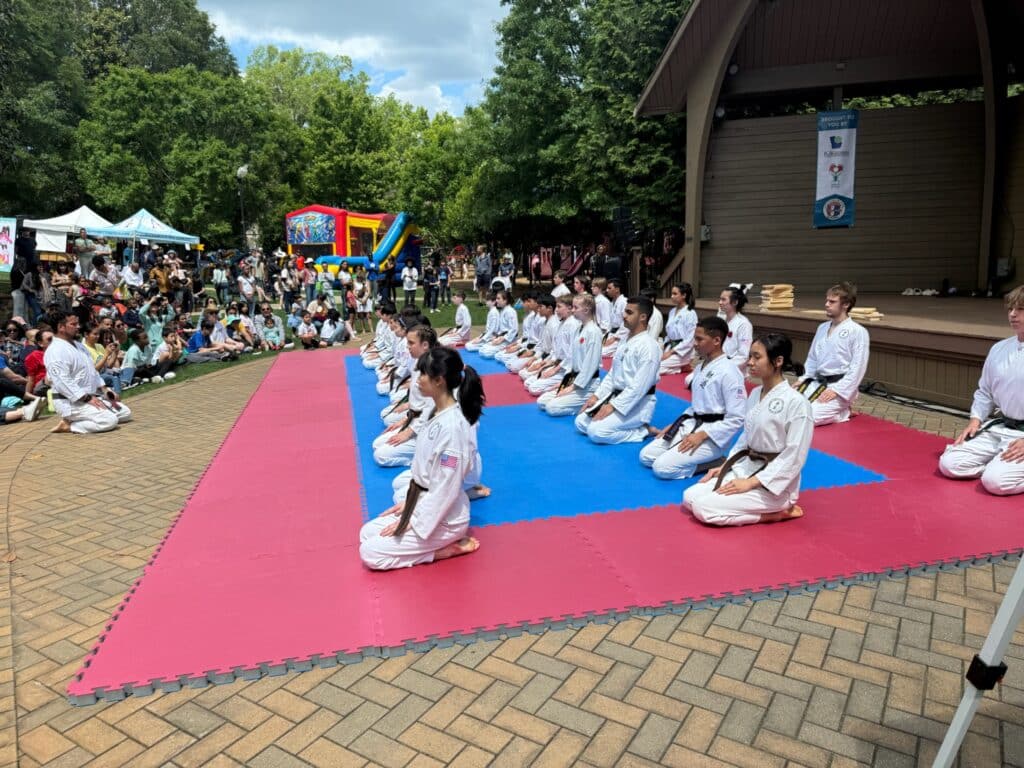

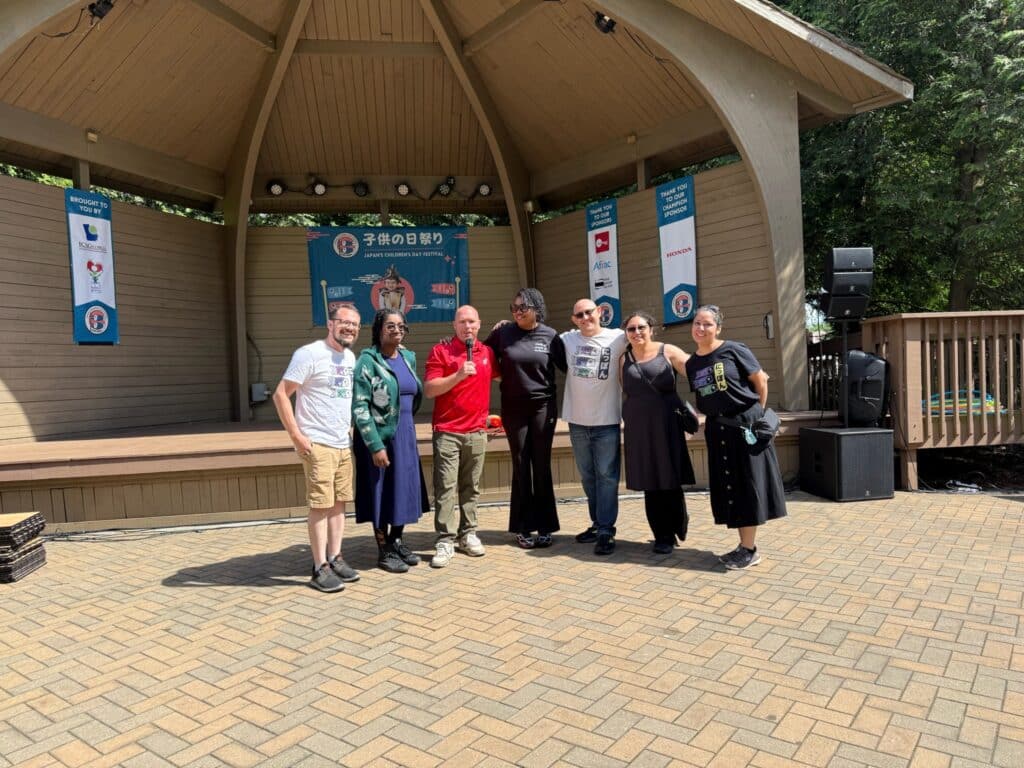
“We’re deeply grateful to all our sponsors, performers, volunteers and families who made the day so special,” said Jeremy Williams, president of the ICAGeorgia PTO.
As Norcross continues to grow as a hub for diverse cultural events, Japan’s Children’s Day Festival stands out as a joyful, family-focused experience with the goal of continuing for years to come.
Follow Japan’s Children’s Day Festival (@JapansChildrensDayFestival) on Instagram and Facebook, and stay tuned for next year’s exciting event.
About ICAGeorgia
The International Charter Academy of Georgia is a statewide charter school available free of charge to any K–6 student residing in Georgia.
Located in Peachtree Corners, the school offers a dual language immersion program in both English and Japanese, a rigorous standards-based curriculum, extracurricular activities and multiple opportunities throughout the year to engage in cross-cultural community.
For more about the school, visit internationalcharteracademy.org.
Related
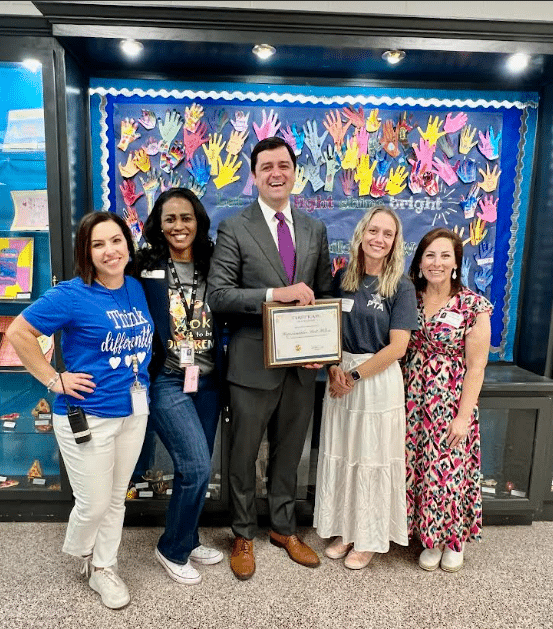
Simpson Elementary School celebrated Exceptional Children’s Week (ECW) last month with five days of special activities to recognize their special needs population and all of their exceptional students.
April 14–18 is set aside each year to celebrate children with disabilities, gifts and talents. This year’s ECW theme was Bridging Gaps and Building Futures, and the school was happy to take part.
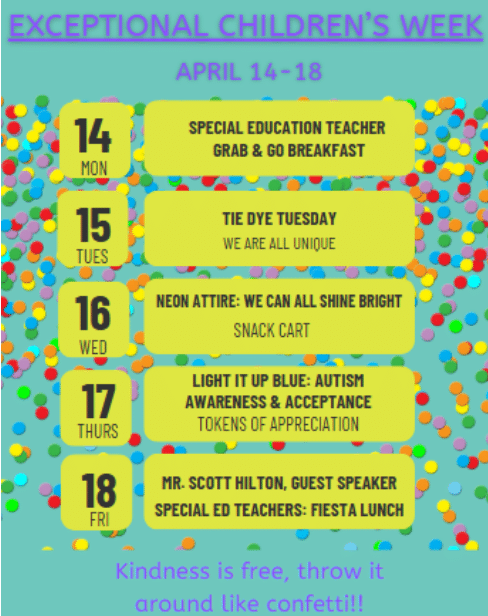
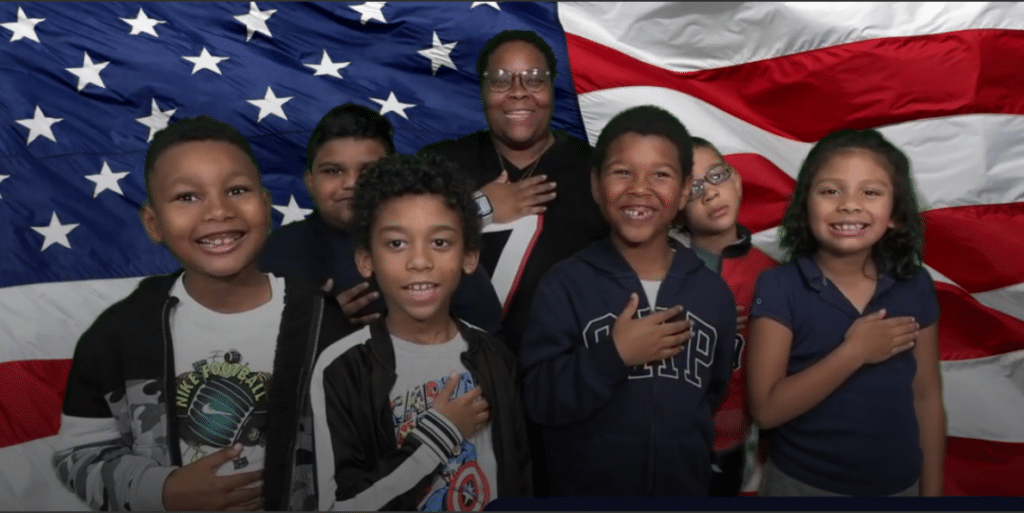
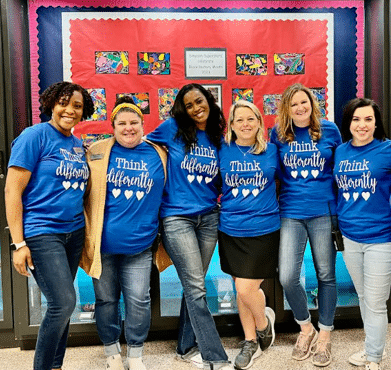
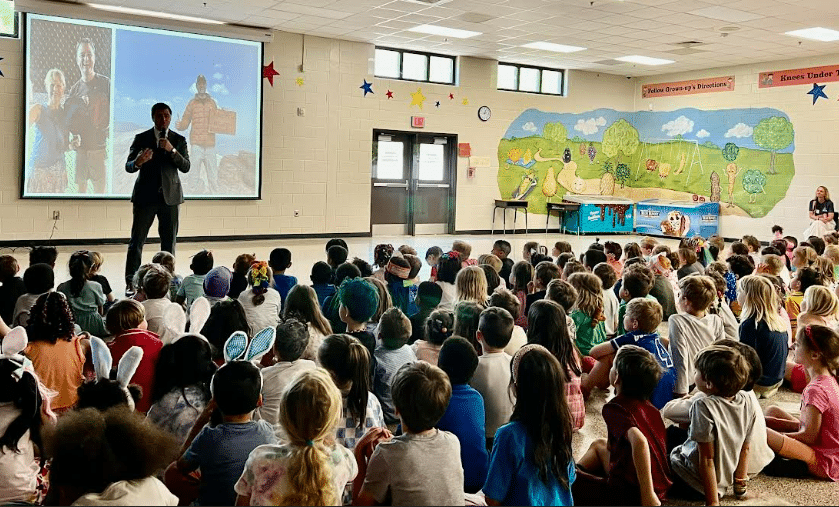
They highlighted each day of the week on the morning news with fun facts about notable people in society — and throughout history — who have overcome challenges with their disabilities, including actor Daniel Radcliffe (who has lived with dyspraxia for his entire life), Tom Cruise, Whoopi Goldberg, Frida Kahlo and Helen Keller.
Simpson Elementary’s technology team also pre-recorded various special needs classes reciting the Pledge of Allegiance every day of the week.
Guest speaker
To end their ECW with a bang, they invited former Simpson Elementary parent, State Representative Scott Hilton, to come in and speak to their K-2 classes about raising his son, Chase (who is autistic and now a student at Norcross High School), and how being different is okay.
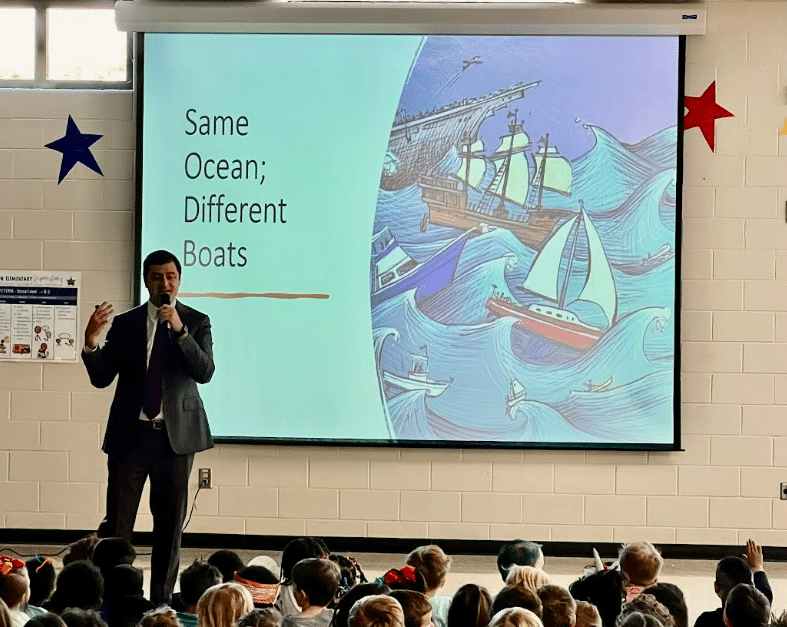
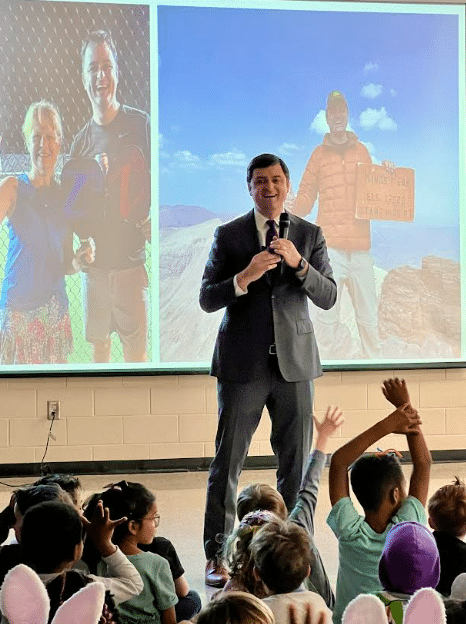
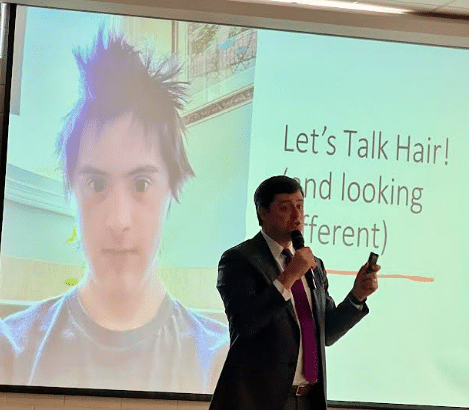
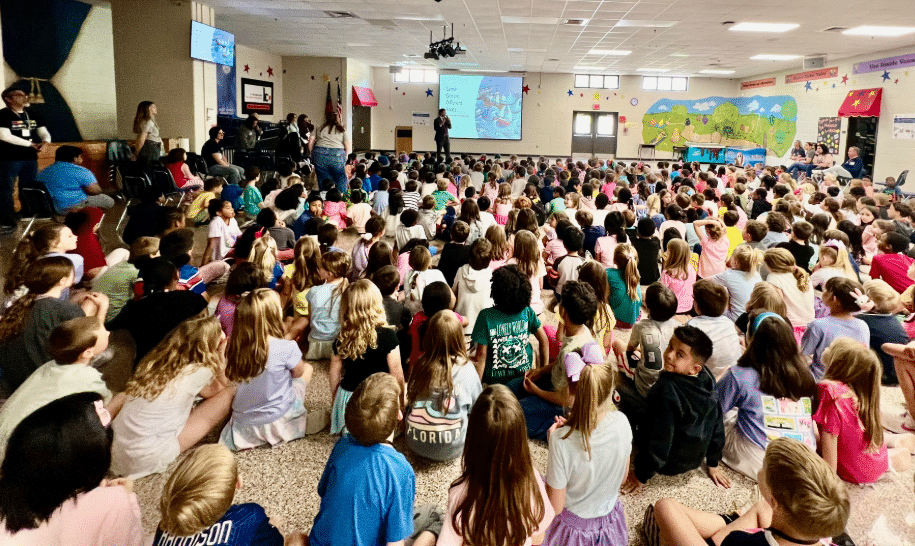
“Showing kindness and being inclusive is the best version of humanity,” said Dr. Taffeta Connery, Simpson Elementary School principal, in a statement about the event.
“Simpson Elementary has a special needs population of 214 (23%) of 946 students. [And] … we strive to ensure that our students are valued, recognized and instilled with high expectations for all.”
For more about Simpson Elementary, visit simpsones.gcpsk12.org.
Related
Education
Paul Duke STEM High School Student Earns CGO Scholarship
Published
4 weeks agoon
May 2, 2025
Cobb Global Outreach Inc. (CGO Inc.), a non-profit organization dedicated to enhancing financial literacy and educational opportunities, recently awarded three scholarships to metro Atlanta high school seniors, including one to Paul Duke STEM student, Baylor M. Brown.
The scholarship initiative underscores CGO Inc.’s commitment to empowering youth through financial education and support.
According to CGO’s social media pages, these outstanding students have shown incredible dedication and resilience in their academic journeys. “We are proud to support their continued success and look forward to seeing all that they will achieve!”
Scholarship details and impact
The scholarships provided by CGO Inc. are designed to alleviate financial barriers and encourage academic excellence among students pursuing higher education. Each scholarship recipient will receive financial assistance to support their educational endeavors, along with resources to enhance their understanding of financial management and literacy.
The scholarship recipients have demonstrated remarkable potential and a strong commitment to making a positive impact in their local community and beyond.
Bobby Cobb, CEO and founder of Cobb Global Outreach Inc., expressed enthusiasm about the partnership, stating, “We are honored to support the students … . By investing in their education and financial literacy, we aim to equip them with the skills necessary for a successful and financially secure future.”
Looking ahead
Cobb Global Outreach Inc. remains committed to expanding its scholarship programs and financial literacy initiatives. The organization plans to collaborate with additional schools and community partners to further its mission of closing the wealth gap and fostering economic empowerment among youth.
About Cobb Global Outreach Inc.
Founded in January 2021, Cobb Global Outreach Inc. is dedicated to educating middle and high school students about financial literacy. The organization believes that providing students with tools and resources related to financial literacy will help narrow the wealth gap and promote economic empowerment.
For more information, visit cobbglobaloutreachinc.com.
Related
Read the Digital Edition
Subscribe
Keep Up With Peachtree Corners News
Join our mailing list to receive the latest news and updates from our team.
You have Successfully Subscribed!

From Boardrooms to the Himalayas: Vandana’s Journey to Purpose and Growing with Intention [Podcast]

Guardians of the Jukebox to Play the VoxStage on May 31

Brandon Branham Honored for Transformative Leadership in Peachtree Corners

Music Matters Productions Expands Peachtree Corners Headquarters

“Geek Culture” Shines at 2025 MomoCon

Celebration and Community: ICAGeorgia Wraps Up School Year with Two Festive Events

Vox-Pop-Uli Launches RED Initiative for Veterans’ Support

The PCBA Awards $500 to Light Up The Corners at After-Hours Event

Vox-Pop-Uli Launches RED Initiative for Veterans’ Support

The PCBA Awards $500 to Light Up The Corners at After-Hours Event

“Geek Culture” Shines at 2025 MomoCon

Celebration and Community: ICAGeorgia Wraps Up School Year with Two Festive Events

Guardians of the Jukebox to Play the VoxStage on May 31

Music Matters Productions Expands Peachtree Corners Headquarters

Brandon Branham Honored for Transformative Leadership in Peachtree Corners

From Boardrooms to the Himalayas: Vandana’s Journey to Purpose and Growing with Intention [Podcast]

Light up the Corners [Video]

Capitalist Sage: Business Leadership in Your Community [Podcast]

Cliff Bramble: A Culinary Adventure through Italy

Top 10 Brunch Places in Gwinnett County

A Hunger for Hospitality

THE CORNERS EPISODE 3 – BLAXICAN PART 1

Top 10 Indoor Things To Do This Winter

The ED Hour: What it takes to Remove Barriers from Education









